|
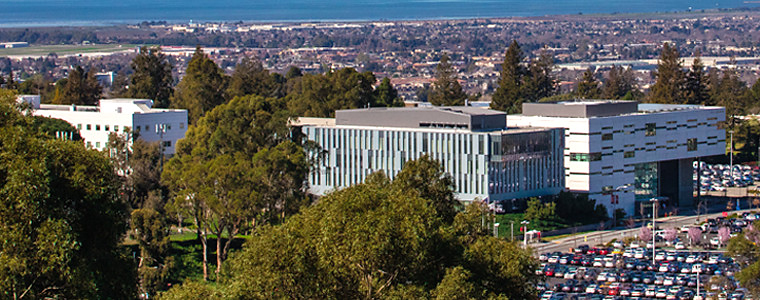
California State University, East Bay is a comprehensive four-year institution that enrolls more than 13,000 students and offers undergraduate and graduate programs in a wide range of disciplines. Cal State East Bay’s spacious 342-acre Hayward campus, situated in the rolling hills above San Francisco Bay, offers students and visitors panoramic views of the bay and bridges, as well as the vibrant cities and open space that surround the campus. With its wide expanses of lawns, tree-lined walkways, fountains, and beds of native California plants, the campus is one of the most beautiful in the CSU system. The University is recognized as a “Best in the West” college and a Best Business School by the Princeton Review and as a “top-tier” masters-granting university by U.S. News & World Report in its “America’s Best Colleges” guide.
Click on any link for more information:
|
|
University Mission, Shared Strategic Commitments, and Institutional Learning Outcomes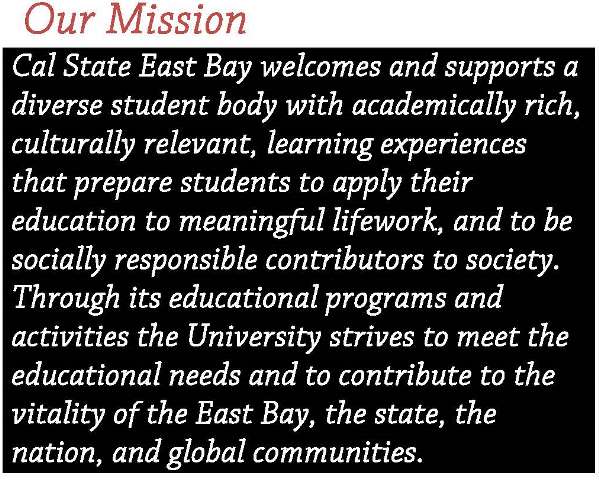 Shared Strategic Commitments Shared Strategic Commitments
Cal State East Bay takes pride in its eight Shared Strategic Commitments, which express the university’s values and aspirations:
- Reinforce academic quality through open-minded inquiry, innovative teaching, engaged learning, and distinguished scholarship.
- Enhance our inclusive campus, responding to the backgrounds and interests of our diverse community and promoting their academic, professional and personal development.
- Serve students first, by expanding access and enhancing each student’s educational experience and prospects for success as a graduate and life-long learner.
- Foster a vibrant community through enriched student services and student life that support student engagement and learning.
- Contribute to a sustainable planet through our academic programs, university operations, and individual behavior.
- Continuously improve our efficiency, transparency, and accountability while practicing mutual respect, responsiveness, and collaboration across the University.
- Support the civic, cultural, and economic life of all communities in the regions we serve through partnerships that promote education and social responsibility.
- Demonstrate our continuing record of leadership and innovation in higher education, focused on 21st century skills, including science, technology, engineering, and mathematics (STEM).
Institutional Learning Outcomes
Using competencies developed through general education, their scholarly disciplines and co-curricular activities, graduates of CSUEB will be able to achieve the following outcomes:
- Thinking and Reasoning
- Think critically and creatively and apply analytical and quantitative reasoning to address complex challenges and everyday problems.
- Communication
- Communicate ideas, perspectives, and values clearly and persuasively while listening openly to others.
- Diversity
- Apply knowledge of diversity and multicultural competencies to promote equity and social justice in our communities.
- Collaboration
- Work collaboratively and respectfully as members and leaders of diverse teams and communities.
- Sustainability
- Act responsibly and sustainably at local, national, and global levels.
- Specialized Education
- Demonstrate expertise and integration of ideas, methods, theory and practice in a specialized discipline of study.
Assessment for Continuous Improvement
 Cal State East Bay is committed to continuous improvement. Students, faculty and staff are asked to participate in learning assessments at the course, program, and university levels. The information used for assessment includes individual student work (assignments, essays, exams, projects, etc.), in addition to surveys and other indirect methods. Cal State East Bay is committed to continuous improvement. Students, faculty and staff are asked to participate in learning assessments at the course, program, and university levels. The information used for assessment includes individual student work (assignments, essays, exams, projects, etc.), in addition to surveys and other indirect methods.
In order to assess the overall educational effectiveness of programs and the university, student work at Cal State East Bay is used on an aggregated basis to provide information for program improvement, as well as to demonstrate accountability to various stakeholders, including our students, the general public, and our accrediting agencies.
Students at Cal State East Bay should expect that their academic work may be used for assessment purposes.
Quarter System
Cal State East Bay currently operates on the quarter system. Each quarter (fall, winter, spring, summer) is approximately 11 weeks in length (10 weeks of instruction, plus 1 week of final exams). Enrollment in a quarter after admission to the university constitutes matriculation, including enrollment in all Special Session courses. (Special Session courses are groups of self-support courses which have been approved to confer residence credit, with the exception of Open University courses.) Enrollment in Open University courses, as well as in Continuing Education courses, does not constitute matriculation.
One (1) semester unit is equivalent to one and one-half (1 1/2) quarter units of credit. One (1) quarter unit is equivalent to two-thirds (2/3) of a semester unit.
Semester Converstion 2018
 Semester Conversion is underway at CSU East Bay. This is a multi-year effort to transition the campus from a quarter to a semester calendar. The first term on the semester calendar will be Fall 2018. Semester Conversion is underway at CSU East Bay. This is a multi-year effort to transition the campus from a quarter to a semester calendar. The first term on the semester calendar will be Fall 2018.
CSUEB is committed to providing information and engaging all of the CSUEB community in the process of conversion. On our website, you will find material about the initiative, including news and announcements; information for CSUEB students, faculty and staff; resources about how other universities have navigated this process; and the timeline for our conversion. There will be frequent updates to the site.
Accreditation
Cal State East Bay is accredited by the Western Association of Schools and Colleges Senior College and University Commission (WSCUC), 985 Atlantic Avenue, Suite 100, Alameda, CA 94501; phone: (510) 748-9001. The Commission is an institutional accrediting agency recognized by the U.S. Department of Education and is periodically reviewed by the Council for Higher Education Accreditation (CHEA).
- The B.A. and M.A. in Music are accredited by the National Association of Schools of Music.
- The master’s education program in Speech-Language Pathology is accredited by the Council on Academic Accreditation in Audiology and Speech-Language Pathology of the American Speech-Language-Hearing Association, 2200 Research Boulevard #310, Rockville, Maryland 20850, 800-498-2071 or 301-296-5700.
- The undergraduate and graduate programs in the College of Business and Economics are accredited by the Association to Advance Collegiate Schools of Business (AACSB International).
- All of the university’s programs for teaching and services credentials are approved by the California State Commission for Teacher Credentialing.
- The professional preparation programs of the College of Education are accredited by the National Council for Accreditation of Teacher Education.
- The School Psychology credential program has received full approval from the National Association of School Psychologists.
- The B.S. in Chemistry is approved by the American Chemical Society.
- The B.S. in Nursing is accredited by the Commission on Collegiate Nursing Education, One Dupont Circle, NW, Suite 530, Washington, DC 20036, (202) 887-6791 and the California State Board of Registered Nursing.
- The B.S. in Industrial Engineering is accredited by the Engineering Accreditation Commission of ABET, http://www.abet.org.
- The Master of Social Work is accredited by the Council on Social Work Education.
- The Continuing Education certificate program in Paralegal Studies is approved by the American Bar Association (ABA).
- The Continuing Education certificate program in Chemical Dependency is accredited by the California Association of Alcoholism and Drug Abuse Counselors (CAADAC).
- The Continuing Education certificate program in Human Resource Management is approved by the Human Resource Certification Institute (HRCI) for recertification hours.
- The Continuing Education certificate program in Project Management is approved by the Project Management Institute (PMI).
University Extension ProgramsContinuing Education
 Continuing Education at Cal State East Bay features a broad spectrum of courses, certificate programs, and degree programs that complement the University’s regular curriculum, and meet the academic, professional, creative and lifelong learning goals of its diverse community. Continuing Education at Cal State East Bay features a broad spectrum of courses, certificate programs, and degree programs that complement the University’s regular curriculum, and meet the academic, professional, creative and lifelong learning goals of its diverse community.
CE designs courses to fulfill the needs of current job market trends, enhance professional development, and promote personal enrichment. Offering more than 40 certificate and degree programs in a variety of industries and fields, CE allows you to explore career options and pursue opportunities for advancement.
You may take one or more individual courses, enroll in a certificate program, or attend a seminar or conference. In some cases, academic credit is awarded; while in others, Continuing Education Units (CEUs) are available. In programs designed specifically for personal enrichment, no academic credit is awarded.
American Language Program
The university’s American Language Program provides instruction for international students in academic English and introduces them to American culture. Each year, students from more than 25 countries enroll in the program. After graduating from the American Language Program, international students often enroll as matriculated students in the university.
Open University Concurrent Enrollment
The “Open University” program allows individuals to enroll in regular university classes without being formally admitted to the university. Regularly enrolled resident or non-resident students are not eligible to take Open University courses.
Open University students will be granted “Open University” extension credit for coursework. There are limits on the number of Open University extension units that may be applied toward university degrees. Up to 36 units may be applied towards a baccalaureate degree and up to 13 units for a master’s degree.
Restrictions
Continuing Education registration, in most courses or programs, does not require formal admission to the university. For some programs, however, students may be required to meet certain requirements prior to being eligible to register. Only registration in self-support Special Session classes provides “continuing student” status to admitted, matriculated students.
General Information
Information on courses, programs, and enrollment procedures is available through University Extension’s quarterly bulletin, on the university website (www.ce.csueastbay.edu), by phone (510-885-3605), and by e-mail (ce@csueastbay.edu).
About the Concord Campus
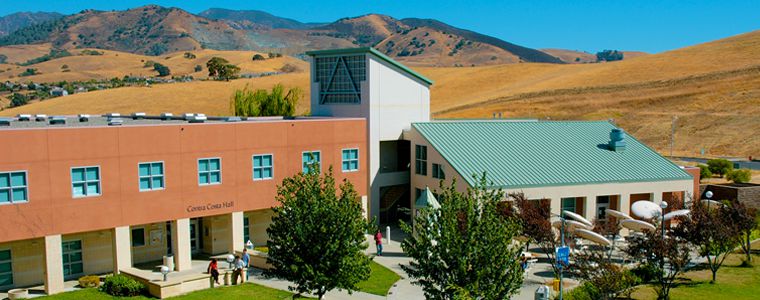 The Concord Campus is a branch campus of Cal State East Bay located in Concord, and near Clayton, Walnut Creek, Pleasant Hill, Pittsburg and Antioch in beautiful Contra Costa County. The 386-acre campus includes over 300 acres of open space, community sports fields and views of Mt. Diablo and the Sacramento Delta, and is one of the largest branch campuses within the CSU system. Located at 4700 Ygnacio Valley Road, the campus is uniquely positioned to serve the educational needs of county residents. Established in 1981, the Concord Campus was the first CSU branch campus with a permanent location, and has provided quality education and services for more than two decades. Many residents have benefited from Cal State East Bay’s educational presence and have enjoyed the small class size and intimate educational experience that the Concord Campus provides. The Concord Campus is a branch campus of Cal State East Bay located in Concord, and near Clayton, Walnut Creek, Pleasant Hill, Pittsburg and Antioch in beautiful Contra Costa County. The 386-acre campus includes over 300 acres of open space, community sports fields and views of Mt. Diablo and the Sacramento Delta, and is one of the largest branch campuses within the CSU system. Located at 4700 Ygnacio Valley Road, the campus is uniquely positioned to serve the educational needs of county residents. Established in 1981, the Concord Campus was the first CSU branch campus with a permanent location, and has provided quality education and services for more than two decades. Many residents have benefited from Cal State East Bay’s educational presence and have enjoyed the small class size and intimate educational experience that the Concord Campus provides.
Degree Programs
Functioning as an upper-division and post baccalaureate campus in a thriving, suburban region, the Concord Campus offers varied curriculum taught by Cal State East Bay faculty and provides quality educational programs while making use of modern educational technologies to deliver state-of-the-art programs. In Fall 2008, the Concord Campus began providing lower-division courses for Pre-nursing students only.
Academic degree and credential programs currently offered at the Concord Campus are:
-
Undergraduate Fields of Study
- See the Concord Campus website to see the most current majors and programs available. Some courses within the following majors are available at the Concord Campus. Degree completion for these majors may require students to complete coursework online or at the Hayward Campus:
- Criminal Justice
- Health Sciences
- Human Development
- History
- English
-
Certificates
- Multiple Subject
- Single Subject
- Paralegal Program Certificate
- Pre-Professional Health Academic Program
Application and/or registration through either the Hayward or Concord Campus qualifies a student to enroll in courses at both sites. Academic expectations and standards, as well as university policies, are the same at both locations.
Services and Facilities
The Concord Campus promotes student success through a variety of services. These include academic advising on general education (GE) and graduation requirements, as well as administrative and instructional support services. Students are referred to their departments for major advising. Instructional support services include advanced computer laboratories, modern smart classrooms, a branch of the university’s library, and a free shuttle service between the campus and the Concord BART station. There is also an on-site café/bookstore and student lounge.
About Our Campus Facilities
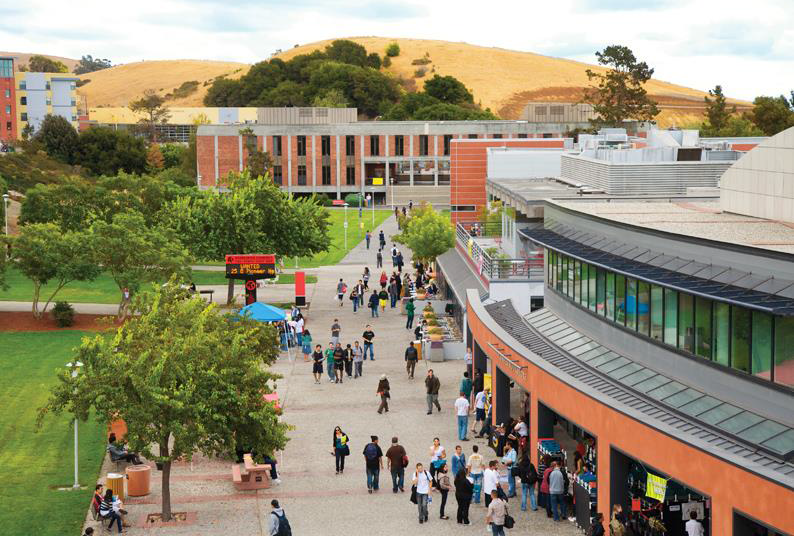 Our outstanding instructional facilities include over 150 classrooms and teaching laboratories and over 200 specialized instruction rooms. Discipline-specific computer labs and general access labs with PCs and Apple computers are available for student use. The University Library, with its rich collections and online catalog, features individual and group study areas, as well as an innovative Learning Commons offering expert information technology support, access to extensive information resources, library reference services, and information literacy instruction. Our outstanding instructional facilities include over 150 classrooms and teaching laboratories and over 200 specialized instruction rooms. Discipline-specific computer labs and general access labs with PCs and Apple computers are available for student use. The University Library, with its rich collections and online catalog, features individual and group study areas, as well as an innovative Learning Commons offering expert information technology support, access to extensive information resources, library reference services, and information literacy instruction.
Food services, lounges, and meeting rooms are available through the University Union, a popular student gathering place. It also offers specialized services such as a credit union and an automatic teller machine. A major renovation of the University Union includes new retail food outlets, and space for growing student social and academic activities. The Student Recreation and Wellness Center houses a gymnasium, an elevated running track, two fitness centers and two multi-purpose exercise studios, locker rooms, and associated support space to promote nutrition, health and wellness.
Other campus facilities include a 500-seat theater, a television studio, a bookstore, a student health center, a 100,000 square foot student services and administration building, and a 67,000 square foot student and faculty support center. Pioneer Heights, the university’s on-campus student apartment complex, offers housing for more than 1,300 residents, as well as a full service Dining Commons.
Cal State East Bay’s Concord Campus, in central Contra Costa County, offers upper division and graduate instruction. Blending the natural beauty of its foothill setting with attractive facilities, small classes, and a personalized approach to teaching and learning, the Concord Campus serves more than 1,500 students. Classes are conducted in 21 classrooms and eight teaching laboratories, including a 125-seat auditorium and a spacious art studio.
Further demonstrating the University’s regional commitment, the newly renovated Cal State East Bay’s Oakland Professional Development Center specializes in programs for working adults and offers professional development and certificate courses.
Cal State East Bay is also part of a university consortium that operates the Moss Landing Marine Laboratories in Monterey Bay. In addition, the University runs a San Francisco Bay shore lab with marine and freshwater craft operating in the bay and Sacramento River delta.
Campus and Bay Area Recreation
The Hayward campus recreational facilities include a 20,000 square foot main gymnasium, a dance studio, swimming pools, racquetball/tennis/volleyball courts, several playing fields and a par course. The 54,000 square foot Recreation and Wellness center, funded by student fees, opened in 2010, with a multi-court gym for basketball, volleyball, or badminton; an elevated running track; two fitness centers with free weights and machines; multipurpose fitness and activity rooms for aerobics, martial arts and dancing; locker rooms; and a juice bar in the lobby.
In addition to its own facilities, activities, and intramural sports, Cal State East Bay’s campuses are close to San Francisco and other Bay Area cities that provide unique cultural opportunities including museums, libraries, art galleries, aquariums, planetariums, theater, sports events, and concerts.
Hiking trails are near both campuses. The extensive Garin and Dry Creek-Pioneer East Bay Regional Parks are located immediately southeast of the Hayward campus. Beautiful Mt. Diablo and the Lime Ridge open space are adjacent to the Concord campus. In addition, proximity to the Pacific Ocean and Sierra Nevada mountains offers recreational diversion as well as excellent laboratories for educational studies.
The main Hayward Campus location is nearby these exciting points-of-interest:
- San Francisco Bay–campus overlooks the Bay and region from the East Bay hills
- Pacific Coast–45 minutes west
- San Francisco, Berkeley, Oakland, Walnut Creek, and Concord–30 to 45 minutes northeast and northwest via BART (Bay Area Rapid Transit) trains and freeways
- Lake Tahoe and Yosemite Valley–four hours northeast and east
- Napa and Sonoma Valleys–one hour north
- Sacramento, the state capital–one and one-half hours northeast
- Santa Cruz beaches and Monterey Peninsula–two hours south
- San Jose and the Silicon Valley–30 to 45 minutes south via freeways
Campus Art Galleries
 The Hayward Hills campus enjoys two exhibition spaces which make it possible to mount shows of varying size and significance. The Hayward Hills campus enjoys two exhibition spaces which make it possible to mount shows of varying size and significance.
The University Art Gallery
Is 2820 square feet of exhibition space. Located in AE 106, the Gallery has one person shows, group shows and student shows in a variety of media. An adjoining courtyard is available to display outdoor sculpture. Admission to the University Art Gallery is free.
The Student Gallery
Is located in AE 274, is a more intimate space. Throughout the year, students present their works for short exhibitions. The days and hours of these shows vary and are also admission free.
Pioneer Bookstore
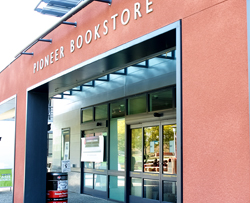 The Pioneer Bookstore’s mission is to support the educational endeavor of the University by offering access to course materials for classes, as well as merchandise and services for the convenience of the campus community. The Hayward campus store is located between the Library and the University Union. The Concord campus store is located in the Campus Union. The Pioneer Bookstore’s mission is to support the educational endeavor of the University by offering access to course materials for classes, as well as merchandise and services for the convenience of the campus community. The Hayward campus store is located between the Library and the University Union. The Concord campus store is located in the Campus Union.
In addition to your required course materials, your bookstore offers: CSUEB logo clothing and gifts, electronics, nursing supplies and scrubs, lab supplies, educationally-discounted computer software and hardware, computer supplies, school and office supplies, testing materials and study guides, general books, art supplies, Peet’s coffee, fresh sandwiches and salads, microwave meals and other snacks. The Hayward store also has a full-service Bank of America ATM.
All course materials and selected merchandise and services can be ordered online for delivery to your address at a fee, or for campus pickup at no additional charge. The website also posts current hours and general information. Hours and general information are also available at 510-885-3507.
Business and Economics Special Facilities
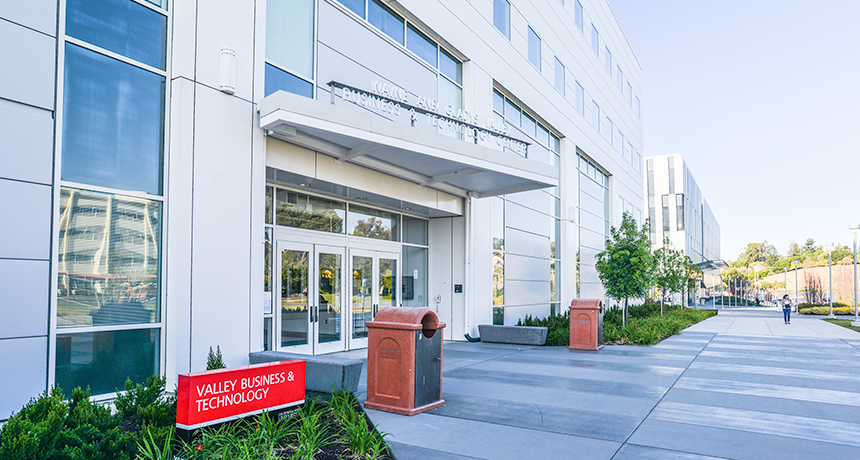 The College of Business and Economics has Student Success and Service Centers in the Valley Business & Technology Center, VBT 129 (510-885-3323) for undergraduate students and VBT 132 (510-885-2419) for graduate students, providing academic guidance for Business and Economics students. In addition, there are numerous student study commons located throughout the building. The College of Business and Economics has Student Success and Service Centers in the Valley Business & Technology Center, VBT 129 (510-885-3323) for undergraduate students and VBT 132 (510-885-2419) for graduate students, providing academic guidance for Business and Economics students. In addition, there are numerous student study commons located throughout the building.
The Acosta Gallery is used for hosting special events and when not in use serves as a gathering place for students.
Moss Landing Marine Laboratories
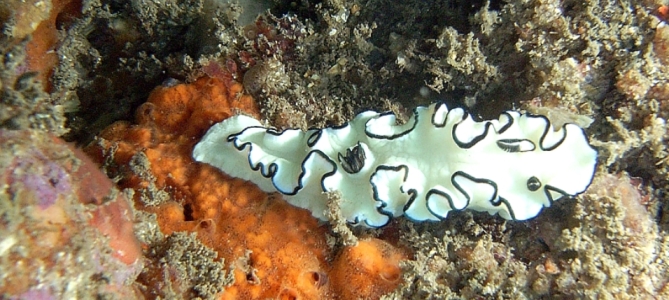 Moss Landing Marine Laboratories (MLML) administers the Master of Science in marine science program for California State Universities in northern and central California, and is dedicated to the pursuit of excellence in both education and research. An outfitted marine operations department, active research diving program and state of the art equipment allow for cutting edge research in a wide variety of disciplines including: marine ecology; the biology of marine plants, invertebrates, fishes, turtles, birds and mammals; oceanography and marine geology; chemistry and biogeochemistry. MLML is known for a hands-on, field-oriented approach which places our students at the frontiers of marine science worldwide where discoveries are being made. MLML provides the skills and training so students become successful scientists, teachers and resource managers serving societal needs involving marine issues. Moss Landing Marine Laboratories (MLML) administers the Master of Science in marine science program for California State Universities in northern and central California, and is dedicated to the pursuit of excellence in both education and research. An outfitted marine operations department, active research diving program and state of the art equipment allow for cutting edge research in a wide variety of disciplines including: marine ecology; the biology of marine plants, invertebrates, fishes, turtles, birds and mammals; oceanography and marine geology; chemistry and biogeochemistry. MLML is known for a hands-on, field-oriented approach which places our students at the frontiers of marine science worldwide where discoveries are being made. MLML provides the skills and training so students become successful scientists, teachers and resource managers serving societal needs involving marine issues.
The lab is situated in an excellent location for the study of the marine world. The Monterey Submarine Canyon, the largest such feature on the west coast of North America, begins within a few hundred meters of the Moss Landing harbor and the MLML research fleet. To the east of MLML is the Elkhorn Slough, the largest tract of tidal salt marsh in California outside of San Francisco Bay, and an important site for shorebirds and fishes. To the north and south are sand dunes, sandy beaches, and extensive kelp forest habitats along the rocky shoreline. Some of the most productive kelp forests and intertidal areas can be found in this region. MLML also is located between two large upwelling centers, which provide nutrients that stimulate an incredible amount of productivity but also provide a wealth of opportunities to study coastal oceanic processes.
Full-time course offerings are available for resident credit and the facilities are used to supplement courses taught on the Hayward Hills campus. The laboratories are located 82 miles south of Hayward on Monterey Bay, and some classes are taught in Salinas. See the Marine Science Program chapter in this catalog for further details and for courses offered at Moss Landing, as well as information on the M.S. program in Marine Science.
C.E. Smith Museum of Anthropology
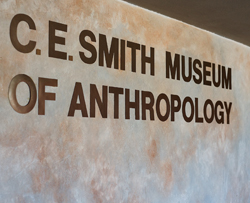 The Clarence E. Smith Museum of Anthropology was established in 1974 and opened its exhibition gallery in 1979. Chartered as a teaching museum for the instruction of museology in an anthropological context, the Museum is named in honor of the late Professor Clarence Smith of the Department of Anthropology. Professor Smith recognized the advantage of demonstrating tangibly, in art and artifact, both human diversity and the range of human achievement throughout the world. Efforts are made to represent both traditional cultural forms and their contemporary expressions and influences. In the forefront of the Museum’s repertory are exhibits designed to illustrate all aspects of human culture from around the world, features of culture change, and technological as well as biological evolution. The Clarence E. Smith Museum of Anthropology was established in 1974 and opened its exhibition gallery in 1979. Chartered as a teaching museum for the instruction of museology in an anthropological context, the Museum is named in honor of the late Professor Clarence Smith of the Department of Anthropology. Professor Smith recognized the advantage of demonstrating tangibly, in art and artifact, both human diversity and the range of human achievement throughout the world. Efforts are made to represent both traditional cultural forms and their contemporary expressions and influences. In the forefront of the Museum’s repertory are exhibits designed to illustrate all aspects of human culture from around the world, features of culture change, and technological as well as biological evolution.
The exhibition galleries of the Museum are located in the southeast corner of the fourth floor of Meiklejohn Hall on the Hayward Hills campus. They are open to the public, Monday through Friday, and by appointment; admission is free. Access to the collections is limited to qualified professionals and students whose scholarly research requires direct examination of the Museum’s holdings. Consult with the Museum’s collection manager for a current list of artifacts held. The staff and director’s office is located on the first floor (1017) of Meiklejohn Hall. Consultations are given by appointment. For information on exhibits and appointments, call the Museum at (510) 885-3104 or (510) 885-3168, Monday through Friday, 8:00 a.m. to 5:00 p.m.
Parking & Transportation Services
 Campus parking facilities are available to students, faculty and staff displaying valid parking permits. Quarterly permits may be purchased online. Parking permits are required Monday-Thursday from 7am-11pm & Fridays from 7am-5pm. Contact Parking and Transportation Services for current rates and the online link. Parking permit dispensers are located in several lots. Daily and Hourly permits may be purchased at these dispensers. In addition, there are a several metered spaces available on the Hayward campus. See campus maps for locations of parking dispensers and meters. Campus parking facilities are available to students, faculty and staff displaying valid parking permits. Quarterly permits may be purchased online. Parking permits are required Monday-Thursday from 7am-11pm & Fridays from 7am-5pm. Contact Parking and Transportation Services for current rates and the online link. Parking permit dispensers are located in several lots. Daily and Hourly permits may be purchased at these dispensers. In addition, there are a several metered spaces available on the Hayward campus. See campus maps for locations of parking dispensers and meters.
Commuting is convenient with three BART (Bay Area Rapid Transit) train stations near the Hayward Hills campus and two BART stations serving the Concord campus. The University offers shuttle service to and from BART at both campuses for faculty, staff, and students. On-campus parking is also available for a daily or quarterly fee.
Hayward Campus
The Hayward and South Hayward stations are within three miles of the Hayward campus, and the Castro Valley station is four miles away. The University operates a shuttle bus between the Hayward BART station and the Hayward campus, which students may ride for free (with a current Bay Card). The AC Transit bus # 60 also runs between campus and the Hayward BART station. Adult bus fare is $2.10 and monthly passes are available. The university is a short distance from Interstate 880 (via Santa Clara Street and Harder Road) and Interstate 580 (via Foothill and Mission Boulevards).
Concord Campus
A free student shuttle operates between the campus and the Concord BART station, both days and evenings, Mondays through Thursdays.
Commuter Services Alternatives
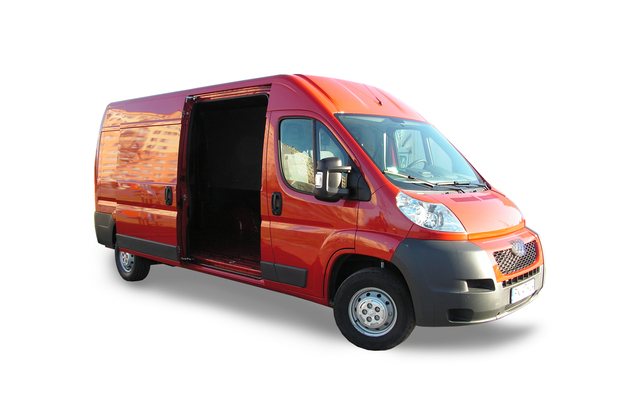 Cal State East Bay offers several commuter services alternatives via the Alternative Transportation Office, (510) 885-3790. Cal State East Bay offers several commuter services alternatives via the Alternative Transportation Office, (510) 885-3790.
A free shuttle service is available Monday - Sunday between the Hayward campus and the Hayward BART station. Free shuttle service is available Monday -Friday between the Hayward campus and the Castro Valley station. The service is available to everyone, however those with a valid CSUEB ID card are allowed to board first. The shuttle bus schedule is available on the Web at: www20.csueastbay.edu/sa/parking/alt-trans/csueb-shuttle.html
The Alternative Transportation office also offers a Vanpool Program for CSUEB Faculty and Staff. In addition the University is a participant in the Zipcar program. We currently have 6 Zipcar vehicles available on campus to rent on an hourly basis. Also, in partnership with our Campus Recreation Department, we have Zagster on campus, which is a bike sharing program. There 10 Zagster bicycles that are available on campus. Zagster bicycles can be rented by the hour and are a great way to get around campus.
Zimride is our new ride sharing program. Open to all faculty, staff & students, Zimride allows you to create a profile and then matches you up with other campus members that share the same schedule and profile as yours. If you are interested in joining Zimride, you can do so at: www.zimride.com/csueb.
AC Transit provides service to the campus Monday - Sunday from the Hayward BART station via Line #60. Bus #60’s schedule can be found: www.actransit.org.
For more information on Alternative Transportation options, please call the Alternative Transportation Office at (510) 885-3790.
Recreation and Wellness Center (RAW)
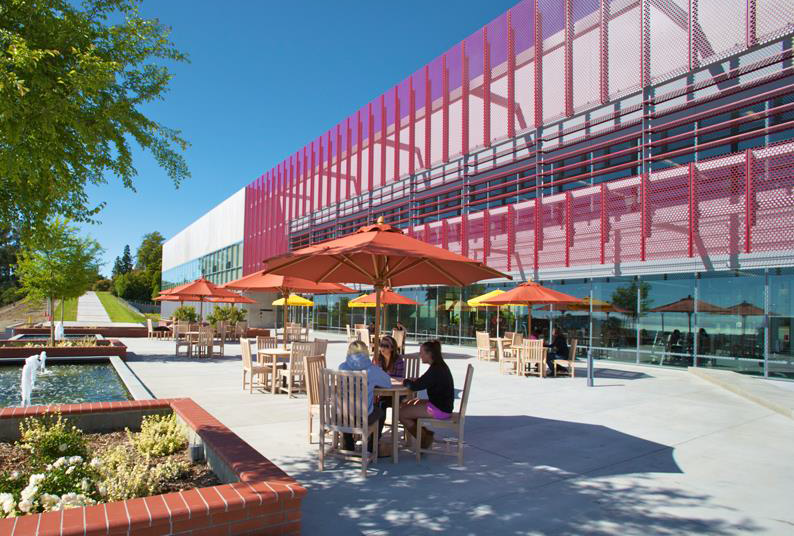 Co-managed by Campus Recreation and University Unions (CRUU), and Student Health and Counseling Services (SHCS) Health Promotion department, the Recreation and Wellness Center (RAW) provides facilities, programs and services to support the CSUEB campus community in their pursuit and maintenance of a healthy and balanced lifestyle. RAW facilities include a two-court gymnasium, two-story fitness center, wellness resource center and lounge, relaxation room, locker rooms, equipment rental, a track and two group fitness studios. Designed to the L.E.E.D. (Leadership in Energy and Environmental Design) Gold certification standards, RAW’s facility design was recognized with a Facility of Merit Award from Athletic Business in 2011. Co-managed by Campus Recreation and University Unions (CRUU), and Student Health and Counseling Services (SHCS) Health Promotion department, the Recreation and Wellness Center (RAW) provides facilities, programs and services to support the CSUEB campus community in their pursuit and maintenance of a healthy and balanced lifestyle. RAW facilities include a two-court gymnasium, two-story fitness center, wellness resource center and lounge, relaxation room, locker rooms, equipment rental, a track and two group fitness studios. Designed to the L.E.E.D. (Leadership in Energy and Environmental Design) Gold certification standards, RAW’s facility design was recognized with a Facility of Merit Award from Athletic Business in 2011.
RAW membership is open to all students, faculty, staff and alumni. Students that pay the UU Rec Fee as part of their tuition fees are eligible for a complimentary membership. Membership includes access to all the RAW facilities as well as a series of programs and services which include nutrition and fitness consultations (students only), fitness equipment orientations, day use lockers, bath and fitness towel service, and specialized sports and fitness equipment. Additional no or low-cost programs available include fitness classes and workshops, personal training, intramurals sports leagues and tournaments, equipment rental, and massage.
RAW is managed and operated by CRUU and SHCS. SHCS offers internships through the Peer Advocates for Wellness (PAW) program. CRUU employs over 100 students in various RAW facility and program operations positions.
Science Facilities
 The College of Science is housed in a 201,000-square-foot science building which includes many specialized teaching laboratories, general purpose personal computers, and specialized computing facilities. The College of Science is housed in a 201,000-square-foot science building which includes many specialized teaching laboratories, general purpose personal computers, and specialized computing facilities.
The Departments of Biological Sciences, Chemistry and Biochemistry, Engineering, Earth and Environmental Sciences, Mathematics and Computer Science, Nursing and Health Sciences, Physics, and Psychology each maintain a number of well-equipped laboratories for undergraduate instruction. Laboratory classes are limited to 24, 20, 16, or 12 students, depending on the discipline. In addition to the normal complement of laboratory equipment, students in the College of Science have access to three modern teaching and research core facilities.
-
College of Science
- BioCore: Support for cellular and molecular biology teaching and research
- Equipment: Existing: DNA sequencer, real time PCR machine, flow cytometer, fluorescent microscope, HPLC, trace DNA lab, cell culture facility;
- Future: confocal microscope, microarray reader, FACS for cell type analysis, robotics
- Supported Activities: Cell culture and cell sorting, DNA sequencing and typing, gene expression studies, forensic science and ancient DNA work
- ChemCore: Support for qualitative, quantitative and structural analyses of chemicals and biomolecules
- Equipment: Existing: 500MHz multi-nuclear FT-NMR spectrometer, gas chromatographic/mass spectrometer, high performance liquid chromatography apparatus with fluorescence detection, FT-IR and UV/visible/infrared (diode array) spectrophotometers, spectrofluorometer and atomic absorption spectrometer.
- Future: microwave synthesizer, fluorescence spectrophotometer, liquid chromatography/mass spectrophotometer
- Supported Activities: qualitative and quantitative analyses of inorganic and organic molecules including nucleic acids and proteins, structural analyses of organic molecules, analyses of environmental samples including pesticides and heavy metals
- CompCore: Support for high capacity computing and visualization
- Equipment: 40-core cluster system; large 9-panel display wall; cluster-driven immersive projected display; workstations with modern graphics cards
- Supported Activities: Faculty and student projects include mathematics visualization, immersive display for panoramic photographs, statistics simulations, surround audio research, graphics rendering algorithms for GPUs.
Biology
Biology Faculty members maintain individual research labs set up with equipment for the research and mentoring of students in the various specialized, research programs. Basic research and teaching in cell and molecular biology takes place in a shared facility, BioCore, which is a 1400 square foot facility set up with major pieces of equipment that facilitate experiments involving cell culture and flow cytometry, DNA sequencing and typing, gene expression studies, forensic science and ancient DNA work. Major instrumentation includes DNA sequencers (CE and next generation), Q-PCR machines, two flow cytometers, fluorescent microscopes, pulse field gel units, pippenpreps, a Bioanalyzer, a trace DNA clean room and a cell culture facility with hoods and incubators. An imaging facility is also maintained in BioCore which includes a wide-field fluorescent microscope with digital camera, and a confocal microscope with 4 lasers lines of excitation and high numerical aperture lenses.
Chemistry and Biochemistry
The Department of Chemistry and Biochemistry houses the ChemCore facility and maintains laboratory instruments and equipment and instruments typical of comparable institutions. The Nuclear Magnetic Resonance (NMR) spectrometer is a 500 MHz instrument that allows structure elucidation of small molecules and biological compounds. Other instruments include several FT-IR spectrophotometers, two gradient capable high performance liquid chromatographs (HPLC), an atomic absorption spectrophotometer (flame, graphite furnace and cold vapor), a fluorescence spectrometer and a capillary gas chromatograph/mass spectrometer (GC/MS). Other specialized equipment includes several gas chromatographs, a molecular imaging system, thermal cyclers, high speed centrifuges, a table top ultracentrifuge, a 96 well plate reader with fluorescence and UV/Vis detection, a plant growth chamber and other incubators, Nanodrop spectrophotometers and Vernier graphing calculators with probes for pH, temperature and voltage measurements. A molecular modeling facility equipped with 24 computers is also available for instruction and research.
Engineering
The Department of Engineering maintains five laboratories:
- Sustainable Construction Materials Lab:
- The newest lab in Engineering, this humidity controlled curing room, houses a cyliner testing machine, a concrete grinder, sieve analysis shaker machines, soils ovens and a concrete mixer.
- Computer Integrated Manufacturing/Quality Testing Lab:
- Serves as a teaching lab; designed and developed to support various engineering courses with equipment ranging from table-top machine tools, robots, coordinate measuring machine and computer workstations to control this equipment.
- Computer Laboratory:
- Houses 50 computer workstations equipped with the latest versions of IE and manufacturing software; open to engineering students to work on projects and homework.
- Human Performance Laboratory:
- Equipped with various types of work measurement hardware and software, a treadmill and a work simulator machine. It also houses two Segway vehicles to study ergonomic design concepts. This laboratory is equipped with multi-media presentation equipment.
- Material Testing Laboratory:
- Houses an MTS machine, a torsion tester, an engineering microscope, and other measurement equipment. The lab houses a plastics processing equipment that is capable of demonstrating various plastics processes such as injection molding, blow molding and extrusion.
Earth and Environmental Sciences
The Department of Earth and Environmental Sciences is equipped with modern research and field instruments including a laser liquid-water isotope analyzer, vibrating tube densimeters, laser diffraction particle-size analyzer, cathodoluminescence microscope; X-ray diffractometer; petrographic and ore microscopes; ground penetrating radar; 24-channel seismographic system, and a proton magnetometer.
Field equipment includes a portable kitchen and other field supplies and a small power boat with sampling equipment for shallow water studies. Laboratories are equipped for sediment analysis, thin-section preparation, and photomicrography. The department also has large collections of minerals, rocks, fossils, and maps.
Computer Science
Computer science and math students at Cal State East Bay have access to some of the most modern and powerful computer equipment available. The campus provides a network backbone, including connection to the Internet and hundreds of personal computers. The department also has equipment of its own, including a network of Unix workstations and classrooms equipped for computerized demonstrations. Several computer labs on campus offer remote access and assistance with problems. CompCore is an advanced computing facility the department shares with the College of Science. Student and faculty projects can use its 40-core cluster system, large 9-panel display wall, immersive projected display system, and several workstations with modern graphics cards.
Nursing
In the Nursing Skills Lab, nursing students practice in a simulated health care setting under the guidance of the Skills Lab Coordinator. This prepares them to move into local hospitals and community health agencies for their clinical patient/client experience.
Physics
Students in Physics have access to world-class experimental facilities for undergraduate research and research training. One research laboratory is dedicated to thin film material science; i.e. organic polymer photovoltaics and metamaterials. Facilities include a thermal evaporator for preparation and characterization tools for electronic transport and THz spectroscopy. Another research laboratory, funded by grants from the National Science Foundation, is dedicated to tests of fundamental physical laws using atomic spectroscopy with state-of-the-art laser systems, magnetic shields, magnetic and electric field controls, and data acquisition systems. Research training facilities include an atom trapping and cooling laboratory, an electron-spin and nuclear magnetic resonance system, solar spectroscopy setup, and high-resolution grating spectrometers.
Psychology
The Department of Psychology maintains laboratories and equipment for conducting student research in development, personality, social psychology, industrial psychology, physiological psychology, perception, conditioning, and cognition. The Psychology department also maintains a computer lab for use by students and faculty.
A computer lab, funded originally by the National Science Foundation, is equipped primarily for instruction of Statistics majors and minors, but is available for use by students in other areas as well. The laboratory has 36 personal computers networked to servers with professional statistical software and data sets. Both hardware and software are state-of-the-art. Applied and theoretical statistics classes use the lab for demonstrations of statistical computing and for class projects in which students learn practical data analytic skills that aid them in the transition from school to work.
Some rooms in the science building have also been set aside to function as computer centers. The Science Computer Lab is a 50 station lab with all the software needed by science students to do their homework. The flex classroom, Science South 149, is wired for students to bring laptops to use in the classroom.
Technology, Communication, and Media Support
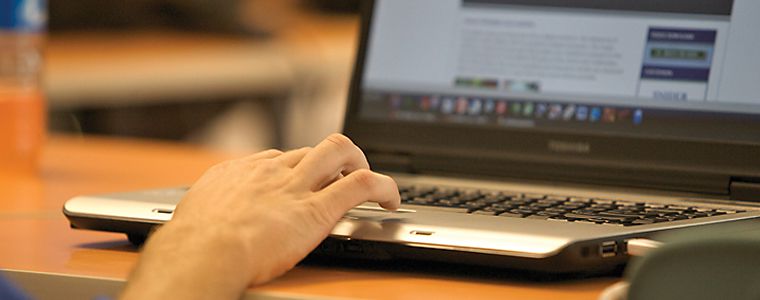 The Division of Information Technology Services, ITS, strives to support and enrich the university experience for students, faculty and staff-an experience that is increasingly technology enabled and network based. ITS teams develop, operate and maintain the University’s shared information technology infrastructures, major administrative and academic information systems, baseline instructional and information technologies, and the requisite technical support services. ITS provides support services to the University community via the following two primary groups: The Division of Information Technology Services, ITS, strives to support and enrich the university experience for students, faculty and staff-an experience that is increasingly technology enabled and network based. ITS teams develop, operate and maintain the University’s shared information technology infrastructures, major administrative and academic information systems, baseline instructional and information technologies, and the requisite technical support services. ITS provides support services to the University community via the following two primary groups:
-
Academic Technology and Support Services (ATSS)
- Academic Technology and Support Services is responsible for the support of academic technologies delivered throughout campus and online. Components of this organization are also engaged in the research of new and emerging technologies as they pertain to the instructional mission of the University. ATSS is comprised of the following:
-
Media and Academic Technology Services (MATS)
- Media and Academic Technology Services (MATS) Located in the Lower Mall across from the Library in room LI 2800, MATS provides support for faculty presentation needs and facilitates their use of instructional technology and instructional media. Some of the services provided by MATS are multimedia production, consultation with individual faculty on computer applications and presentation equipment, coordination of campus-wide technology funding initiatives, online education including the campus learning management system (Blackboard), Internet delivered instruction, streaming media technologies, and instructionally related video editing and production.
-
Classroom Technology Services (CTS)
- Located in LI 1099, CTS provides support for technology resources in the University’s classrooms. Services include maintaining smart classrooms, ensuring the optimal operation of presentation and computer equipment in these rooms, as well as providing technology delivery services such as the delivery of computer carts to non-technology equipped classrooms.
-
User Support Services (USS)
- The USS department of the Division of Information Technology Services provides desktop support and consulting to the academic and administrative faculty and staff. Services include delivery, configuration, troubleshooting, and removal of computers; distributing and installing licensed software applications; consulting with faculty and staff members to assist with the operation of their computers; and providing services to secure the University’s computers and to protect computers from security threats. USS is responsible for the purchase, control, and deployment of all ITS-owned assets including software.
- USS also manages a central Service Desk, which is available to all members of the campus community who have questions regarding computing software, hardware and network communications. The Service Desk can be reached by calling 885-H-E-L-P (4357), e-mailing servicedesk@csueastbay.edu or online at http://servicedesk.csueastbay.edu.
In addition, ITS provides training for staff and administrators in selected university-specific enterprise computer applications. See the training website for more information at http://www.csueastbay.edu/its/departments/cis/training-help/index.html
The University Unions
 The University Union is the “living room” for Cal State East Bay providing services, facilities, and programs to meet the various social, recreational, and cultural needs of the students, faculty, staff, and community. The University Union is the “living room” for Cal State East Bay providing services, facilities, and programs to meet the various social, recreational, and cultural needs of the students, faculty, staff, and community.
The University Union has a great deal to offer. Housed within the Union buildings are the Associated Students, Incorporated and Student Government Offices, Customer Service and Reservation center, Student Life and Leadership Programs office, The Diversity and Inclusion Student Center, a PHiL Station, an ATM machine, food services, recreational facilities, game rooms, and lounge areas. With conveniently located televisions, the Union is the ideal location for catching up on current events, watching a major sporting event, or enjoying music videos in a relaxing atmosphere.
Conference spaces are also available for use by student organizations, academic and administrative departments, CSU East Bay affiliated groups, and off campus groups. The University Union provides an ideal setting for club and organization meetings, lectures, receptions, banquets, and special events.
As the “living room” of the campus, the University Union provides the Cal State East Bay campus with a community center for students, faculty, staff and campus guests.
We look forward to serving you in the University Union!
-
Reservation Procedures
- All groups may request to make reservations online at https://adhayweb13.csueastbay.edu/events/uu-reservation/intex.php.
- Events occurring outside of normal business hours are subject to a fee. No organization or department may reserve space on behalf of another group. Groups may not sell, sublease, or transfer their reservation to another group. In order to avoid operating and personnel charges, reservations should be scheduled during standard hours of operation..
- All groups receive the following complimentary services at no charge:
- Room rental standard set-up
- One head table and one registration table
- Tables for food and beverages (no table skirt)
- Organizations that have access to the University Union facilities include university-recognized student organizations, academic and administrative departments, Cal State East Bay-affiliated groups, and off-campus groups.
- All recognized Cal State East Bay student organizations may make tentative reservations directly, with confirmation pending approval obtained through the Student Life and Leadership Programs Office. Academic/administrative/service departments can make reservations directly. The Union facilities shall not be used for regular academic classes. Deviation from this policy requires approval from the Director of Campus Recreation and University Unions.
- Groups not directly affiliated with the university should make reservations directly with the University Union Reservations Desk and will be required to pay all charges and fees associated with their planned event prior to the event.
-
Room Rental Fees
- Rental fees will be levied according to the University Union room rental fee structure. If special services (i.e., technical support, special equipment) are requested, the University Union will levy the charge appropriate for the service requested. Set-up fees may be assessed for use of the University Union when the sponsor requires set-ups beyond those normally provided.
-
A-V Equipment
- Audio-visual equipment is available upon request at the time of reservation. LCD projectors, screens, P.A. systems, and laptops are available.
-
Cancellations
- The policy of notifying the University Union Reservations office of cancellations enables the Union to meet the growing demand for space. Organizations are encouraged to make reservations as early as possible. Groups that frequently violate the cancellation policy will not have the opportunity to continue reserving space for the duration of the current quarter.
-
Banners/Posters
- Recognized Student Organizations, Associated Students, and university departments may place banners announcing events on one of four (4) designated banner spaces on the South balcony. Banner space is available for a maximum of one week on a first-come, first-served basis and must be reserved through the University Union Reservations Desk at 885-7245.
Title 5, California Administrative Code, Subchapter 5, Article 9, Sections 42350-42353 specifies certain restrictions on the posting and distribution of printed materials on campuses of the California State University. Campus Presidents and/or designees are granted authority for implementing and for issuing directives pertaining to such regulations. The policy for posting can be found at: Posting Policy.
|

